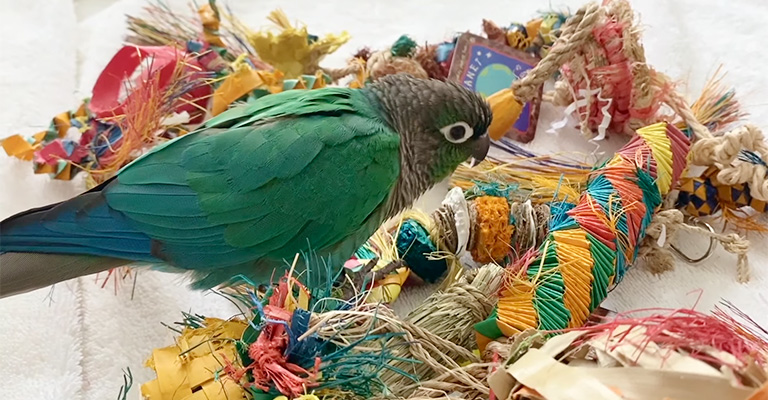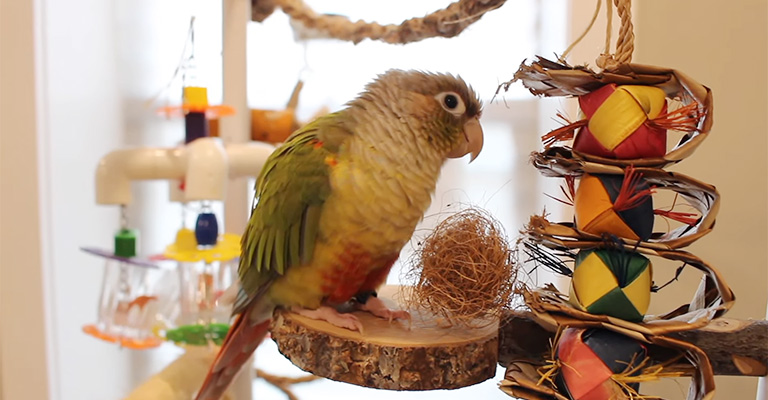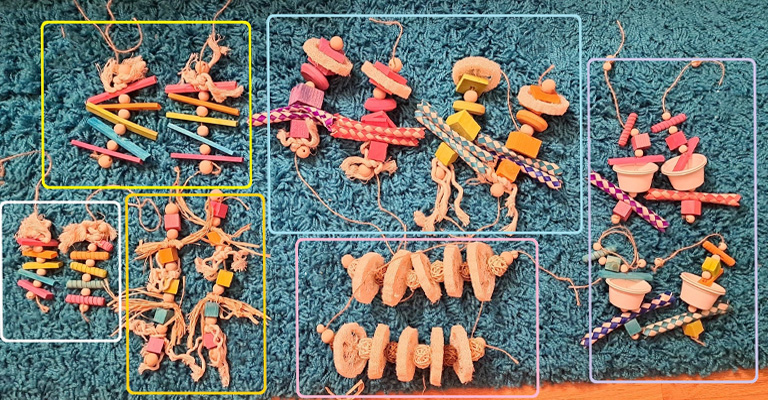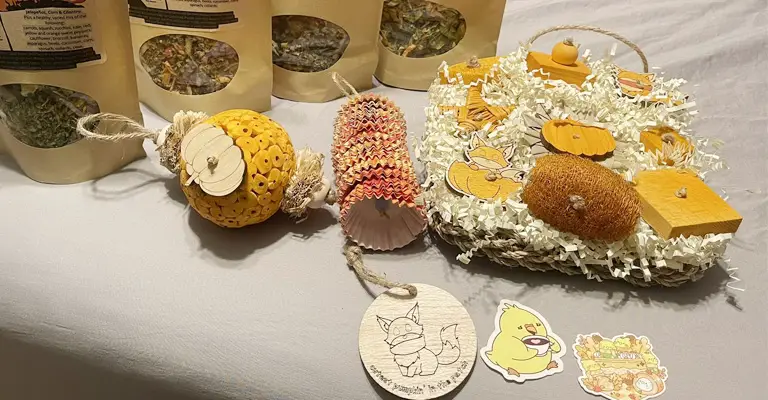Welcome to the exciting world of conure bird ownership, where vibrant personalities and boundless energy are the norms. If you’re a proud conure parent, you know that these intelligent and social birds thrive on interaction and mental stimulation.
One of the keys to a happy and healthy conure is providing them with the best toys for conure birds. In this blog post, we’ll delve into the fascinating realm of conure toys, exploring the top choices to keep your feathered friend entertained and engaged.
From chew toys that maintain their beak health to foraging toys that awaken their natural instincts, we’ll cover the diverse array of options available.
Whether you’re a first-time conure owner or looking to refresh your bird’s playthings, you’ll find valuable insights here. Stay focused.

Playing Behaviour of Conure
Conures, small parrots known for their vibrant plumage and playful personalities, exhibit a range of engaging behaviors. They are highly social birds, often forming strong bonds with their owners and other conures.
Play is an essential part of their daily routine. Conures enjoy toys like swings, bells, and puzzles that stimulate their intelligence and provide physical activity.
These birds are known for their acrobatic antics, often hanging upside down from cage bars or performing aerial flips. They’re also talented mimics and might imitate sounds and words from their environment. Beak-grinding, where they softly grind their beaks, is a sign of contentment.
Conures require mental stimulation and regular interaction to thrive. Time spent outside the cage, whether through supervised flight or playtime on a secure perch, is essential for their happiness. Catering to their playful nature helps ensure a healthy and happy life for these charming avian companions.
Why Should You Buy Some Toys for Your Conure?

Providing toys for your conure is essential for several important reasons:
Mental Stimulation
Toys engage your conure’s mind, preventing boredom and potential behavioral problems. They can solve puzzles, manipulate objects, and explore textures, keeping their cognitive skills sharp.
Physical Exercise
Toys encourage physical activity, helping your conure maintain a healthy weight and muscle tone. Swinging, climbing, and playing with toys simulate natural behaviors in the wild.
Emotional Well-being
Conures are social creatures and need mental and emotional stimulation. Toys can serve as companions when you’re not around, reducing feelings of loneliness and anxiety.
Beak Maintenance
Chewing on toys helps keep their beaks healthy and well-trimmed. This natural behavior is crucial for their overall well-being.
Prevent Destructive Behavior
Without toys, conures may resort to destructive behavior like chewing on furniture or their own feathers. Toys redirect their energy toward appropriate outlets.
Bonding Opportunities
Playing with your conure using toys can strengthen your bond and create positive interactions between you and your pet.
Environmental Enrichment
Toys add variety to their environment, preventing monotony and enhancing their overall quality of life.
Providing a variety of toys for your conure is not just about entertainment; it’s a fundamental aspect of their physical and mental health, promoting happiness and well-being in your feathered friend.
Types of Toys for Conure Birds

There is a wide variety of toys available for conure birds, catering to their physical and mental stimulation. Here are some types of toys suitable for conures:
Chew Toys
These toys are designed for birds to gnaw on, helping to maintain their beak health. Natural wood blocks, wooden beads, and coconut shells are excellent choices.
Foraging Toys
Foraging toys encourage problem-solving and mimic natural foraging behaviors. These toys typically contain hidden treats or compartments that require your conure to work to access the rewards.
Swings and Perches
Swings and perches provide exercise and entertainment. Conures love to swing and climb, and these toys satisfy their need for physical activity.
Bells
Bells are not only fun for conures to ring, but they also make delightful sounds that many conures enjoy. Ensure the bells are bird-safe and the clappers cannot be removed.
Mirrors
Some conures enjoy looking at themselves in mirrors. Just make sure the mirror is not too large, as excessive mirror time can lead to behavioral issues.
Interactive Puzzle Toys
These toys challenge your conure’s intellect. They often involve manipulating parts or solving puzzles to receive a reward, like hidden treats or seeds.
Shreddable Toys
Made of materials like paper, cardboard, or palm leaves, shreddable toys appeal to a conure’s instinct to tear things apart. They can spend hours shredding these toys.
Foot Toys
Small, handheld toys that conures can hold and manipulate with their feet. Examples include small balls, beads, or textured objects.
Noise-Making Toys
Toys with bells, rattles, or noise-producing components can be entertaining for conures, but ensure they are not too loud to avoid stressing your bird.
Colorful Toys
Conures are attracted to bright colors. Toys with vibrant hues and interesting textures can capture their attention.
Remember to rotate your conure’s toys regularly to prevent boredom and keep their environment stimulating.
Things to Consider While Choosing Toys for Conure

When choosing toys for your conure, consider the following factors to ensure their safety, engagement, and overall well-being:
Size and Safety
Opt for toys that are appropriately sized for your conure. Small parts can be a choking hazard, so choose toys that are too large to swallow. Ensure that all components are securely attached to the toy.
Materials
Look for toys made from bird-safe materials. Avoid toys with toxic paints, dyes, or materials that could harm your conure if ingested. Natural materials like untreated wood, cotton ropes, and stainless steel are generally safe choices.
Variety
Provide a variety of toys to keep your conure mentally and physically stimulated. Include toys that encourage different types of activities, such as chewing, climbing, swinging, and foraging.
Durability
Conures are known for their strong beaks, so choose toys that can withstand their chewing and manipulation. Durable toys will last longer and provide ongoing entertainment.
Noise Level
Consider your tolerance for noise when selecting toys with bells or other noise-making components. Some conures can be quite noisy, especially when they enjoy a noisy toy.
Texture and Color
Conures are attracted to bright colors and a variety of textures. Toys with different textures and vibrant colors can pique their interest.
Toxicity
Avoid toys made from toxic materials or those that have been treated with harmful chemicals. Do some research or check with the manufacturer to ensure the safety of the materials used.
Foraging Opportunities
Conures are intelligent birds, and foraging toys can keep them mentally engaged. Look for toys that allow you to hide treats or food, encouraging your conure to work for their rewards.
Ease of Cleaning
Choose toys that are easy to clean or replace. Dirty toys can harbor bacteria and pose health risks to your bird.
Age and Personality
Consider your conure’s age and personality when selecting toys. Younger birds may need more interactive and stimulating toys, while older birds might prefer quieter, more comforting options.
Supervision
Always supervise your conure when introducing new toys to ensure they are playing safely and not ingesting any parts.
Rotation
Rotate your conure’s toys regularly to maintain their interest and prevent boredom.
By taking these factors into account, you can provide a safe and stimulating environment for your conure, promoting their physical and mental well-being while keeping them entertained and happy.
Conure Toys Maintaining and Cleaning Tips
Maintaining and cleaning your conure’s toys is crucial to ensure they remain safe and enjoyable for your bird. Here are some tips on how to do so:
Regular Inspection
Check your conure’s toys regularly for signs of wear and tear, damage, or loose parts. Remove any damaged toys immediately to prevent injury.
Cleaning Routine
Establish a regular cleaning routine for your conure’s toys. How often you clean them depends on the toys’ material and how heavily they are used, but a monthly cleaning is a good starting point.
Disassembly
If your conure’s toys have removable components, disassemble them before cleaning. This makes it easier to clean all parts thoroughly.
Soap and Water
Most toys can be cleaned with mild, bird-safe dish soap and warm water. Scrub them gently with a brush or sponge to remove dirt and debris.
Rinse and Dry
After cleaning, rinse the toys thoroughly to remove any soap residue. Allow them to air dry completely before returning them to your conure’s cage. Ensure they are completely dry to prevent mold growth.
Boiling
For toys made of hard, non-porous materials like plastic or acrylic, you can occasionally boil them to sterilize them. Boil the toys for a few minutes and then let them cool and dry before giving them back to your conure.
Vinegar Solution
For stubborn stains or mineral deposits on toys, you can create a solution of equal parts water and white vinegar. Soak the toys briefly, scrub them, and then rinse and dry thoroughly.
Soak and Shake
For toys with fabric or rope components, soak them in a mixture of water and mild bird-safe soap. After soaking, shake them vigorously to remove dirt and debris. Rinse and dry completely.
Rotate Toys
While cleaning, consider rotating some toys out of the cage and replacing them with freshly cleaned ones. This keeps your conure engaged and prevents them from becoming bored with their toys.
Inspect Chains and Hooks
Check the chains, clips, and hooks that attach toys to the cage. Ensure they are secure and in good condition. Replace any rusty or damaged hardware.
Avoid Harsh Chemicals
Never use harsh chemicals, bleach, or products with strong odors to clean your conure’s toys, as these can be harmful to your bird.
Sanitizing Food-Related Toys
Toys that your conure uses for foraging or food should be cleaned after each use to prevent the growth of harmful bacteria. Use hot water and mild soap for these toys.
By maintaining a regular cleaning routine and using safe cleaning methods, you can ensure that your conure’s toys remain in good condition and free from contaminants, providing a safe and enjoyable environment for your feathered friend.
FAQs
The best toys for conure birds include chew toys, foraging toys, swings, and mirrors. These provide mental stimulation, physical activity, and social engagement, catering to their playful nature.
Yes, prioritize bird-safe materials, avoid small parts that can be ingested, and regularly inspect toys for wear and tear to prevent accidents. Safety should always be the top priority.
It’s a good practice to rotate toys every 1-2 weeks. This prevents boredom and keeps your conure engaged with their environment. Offer a variety of toys to maintain their interest.
Yes, you can create DIY toys using safe materials like untreated wood, paper, and bird-safe components. Be sure to follow bird-safe guidelines and avoid any potentially harmful materials.
Some conures enjoy noisy toys like bells, but consider your tolerance for noise. Ensure the noise level is not overly stimulating or stressful for you or your bird. Always monitor your conure’s response to noisy toys.
Wrapping Up
Selecting the best toys for your conure birds is not just a matter of amusement but an essential aspect of their well-being. These toys not only keep them mentally and physically fit but also nurture the unique bond you share.
By choosing toys wisely, rotating them regularly, and ensuring they are clean and safe, you can ensure your conure leads a vibrant and joyful avian life.
So, embark on this journey of discovery and provide your feathered friend with the ultimate playtime experience. Your conure will thank you with their cheerful chirps and playful antics! Best of luck.